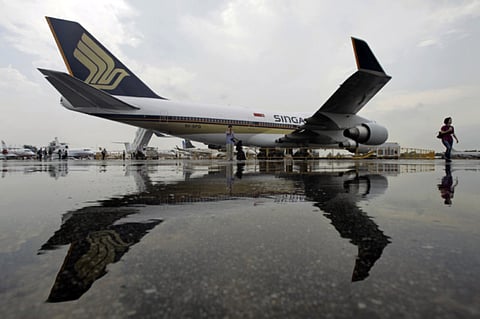Global airlines hunker down for turmoil
Slashing flights is just the first step of more drastic measures to come

Dubai: The crisis engulfing the aviation industry deepened after some of the world’s biggest international carriers announced drastic measures to cope with the coronavirus outbreak, with giants Emirates and Singapore Airlines Ltd. among the latest to slash flights.
Emirates Group announced on Sunday that it will temporarily suspend most passenger operations by March 25. Singapore Airlines said it’s cutting 96 per cent of its capacity through April, mirroring an announcement by Hong Kong’s Cathay Pacific Airways Ltd. on Friday. Airlines across the globe, estimated to be facing more than $100 billion in lost revenue this year, are being forced to make unprecedented groundings and furloughing staff.
Though large carriers should have adequate liquidity to ride out the crisis through June, smaller and less liquid operators may collapse without more support from shareholders and governments, according to Moody’s Investors Service.
“The severity and abruptness of deterioration in the operating environment will precipitate similarly paced erosion of what looked like perfectly adequate excess liquidity just a few weeks ago,” Moody’s analysts wrote in a report dated March 20.
“Most companies will emerge from the crisis with weaker credit fundamentals that may not be readily restorable to pre-coronavirus levels.”
Etihad stops flights for two weeks
Etihad Airways will be suspending all its flights from Thursday (March 26), following directives from UAE authorities to suspend passenger services for two weeks. But cargo and emergency evacuation flights will continue to operate. Beyond the initial 14-day suspension, the situation will be assessed by authorities to decide on whether to re-start passenger operations or not. “As the national airline, we stand in full support of the UAE government’s decision, and are confident that we’re well-prepared to weather the commercial and operational impact this suspension will have on our services,” said Tony Douglas, CEO of Etihad Aviation Group. “These are unprecedented times, and unprecedented decisions are being made by governments, authorities, and companies, including Etihad, to contain the spread of the coronavirus and to help minimize its effects around the world.” Etihad said its passengers will be notified if their flight is cancelled. However, before proceeding to the airport, they are urged to check the status of their flight online. - Sarah Diaa, Staff Reporter
Falling by the wayside
The CEO of Emirates, Sheikh Ahmed Bin Saeed Al Maktoum, said in a memo to staff that some of the airline’s competitors and supply-chain partners may not survive the crisis caused by the virus. The UAE is also home to Flydubai, Abu Dhabi’s Etihad Airways and Air Arabia, the Middle East’s largest discount carrier.
In Asia, Singapore Airlines said it was unclear when it could resume normal services after grounding 185 of 196 aircraft. The company’s shares plunged as much as 10 per cent on Monday and were headed for their lowest close since 1998. They’ve fallen for nine-straight trading days and have lost 32 per cent in March alone.
China aims to merge them
Other major carriers including Delta Air Lines Inc. and American Airlines Group Inc. are waiting for a bailout package to be cleared, while in China, the government has lowered fees and may back mergers of struggling smaller airlines into the bigger state-backed ones. The government has started taking steps to control the parent of Hainan Airlines Holding Co..
The International Air Transport Association, which represents 290 carriers around the world, forecasts the global airline industry needs government aid and bailout measures of as much as $200 billion to survive the crisis. Manufacturing giants Boeing Co. and Airbus SE are also in talks about state support, while Embraer SA is placing some workers on unpaid leave.
Airbus said it’s withdrawing its proposed dividend payout and converting a credit facility to help boost its available funds to about 30 billion euros ($32 billion).
Reshaping airline industry
Assuming the spread of the virus slows by the end of June and demand rebounds, airline capacity globally will fall 25-35 per cent this year, Moody’s said, noting that there is still a high degree of uncertainty around forecasts because virus-related events are unfolding so rapidly.
Long-term demand for travel should be robust and grow steadily, but the virus may have a lasting impact that reshapes the industry, according to the report.
“As behaviors are forced to change during the crisis, some patterns will become more permanent,” it said. “Corporate travel is the most likely casualty as businesses ramp up their investments in remote working and see the costs savings from limited travel.”
Future demand in jeopardy
Moody’s forecasts industry capacity could be cut by more than 60 per cent on average in the second quarter, or over 75 per cent in some cases on a year-on-year basis, depending on the airline’s geographic base and if its operating model is domestic, long-haul or both. Some may cut services altogether in April, Moody’s said. Even in countries where flights had been operating relatively normally, people have changed the way they travel. India, for example, has ordered airlines to keep an empty seat between passengers, according to a circular from the Director General of Civil Aviation. The regulator also called for at least one meter of spacing between passengers at check-in counters, and an “adequate distance” to be kept by cabin crew when serving customers.




![Pakistan Embassy and Consulate stress relying only on verified sources before travelling. [Illustrative image]](http://media.assettype.com/gulfnews%2Fimport%2F2024%2F01%2F11%2FStock-PIA_18cf721b120_large.jpg?w=320&auto=format%2Ccompress&fit=max)

